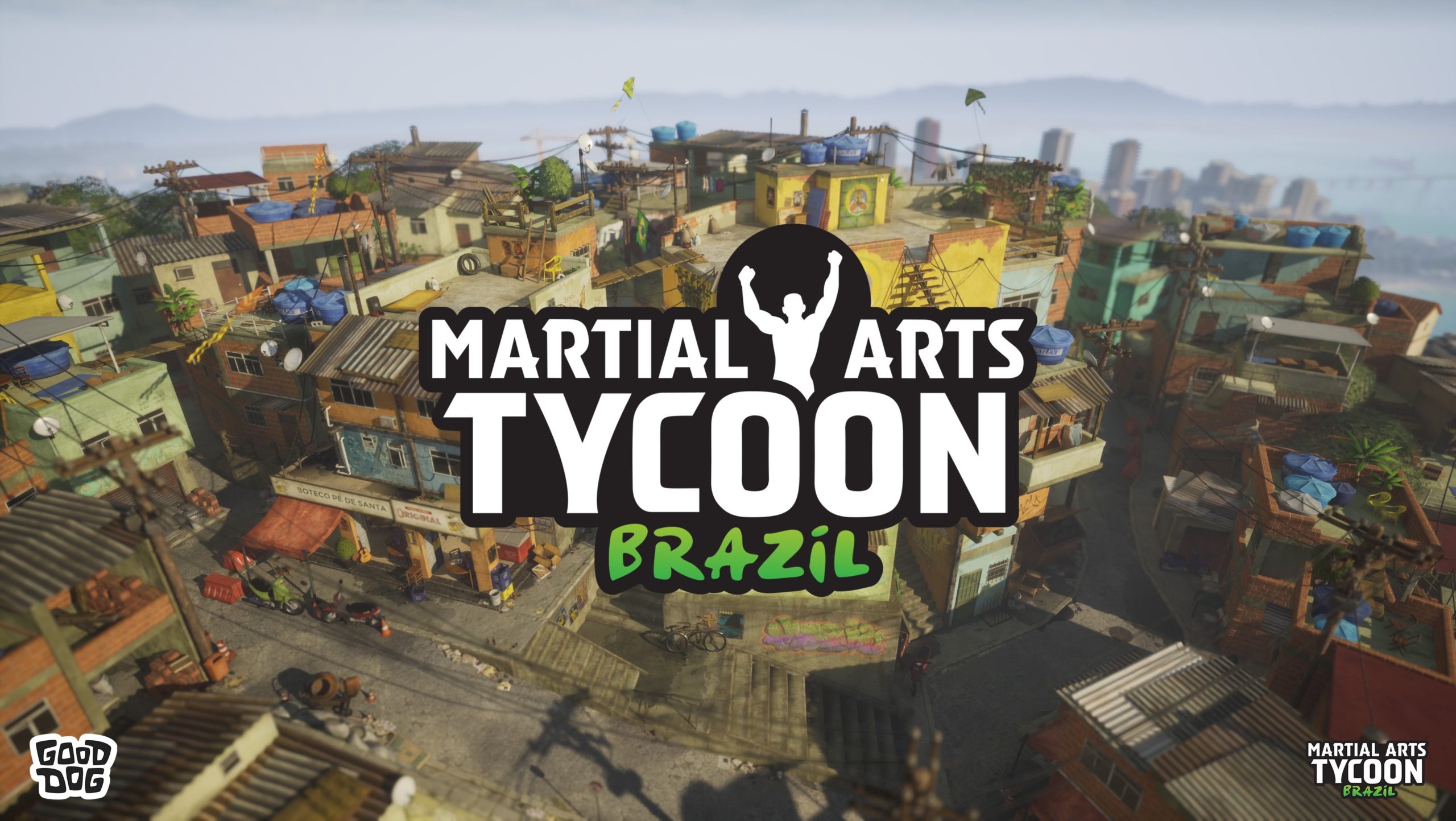Chance Glasco is best known for his work on the monstrously popular Call of Duty games, including the Modern Warfare series. Now, however, Glasco and his new team at Good Dog Studios have pivoted away from the shooter genre into a different game entirely with a fresh motive behind it. Martial Arts Tycoon: Brazil is set for a world premiere at Brazil’s International Games (BIG) Festival on the 30th June 2023.
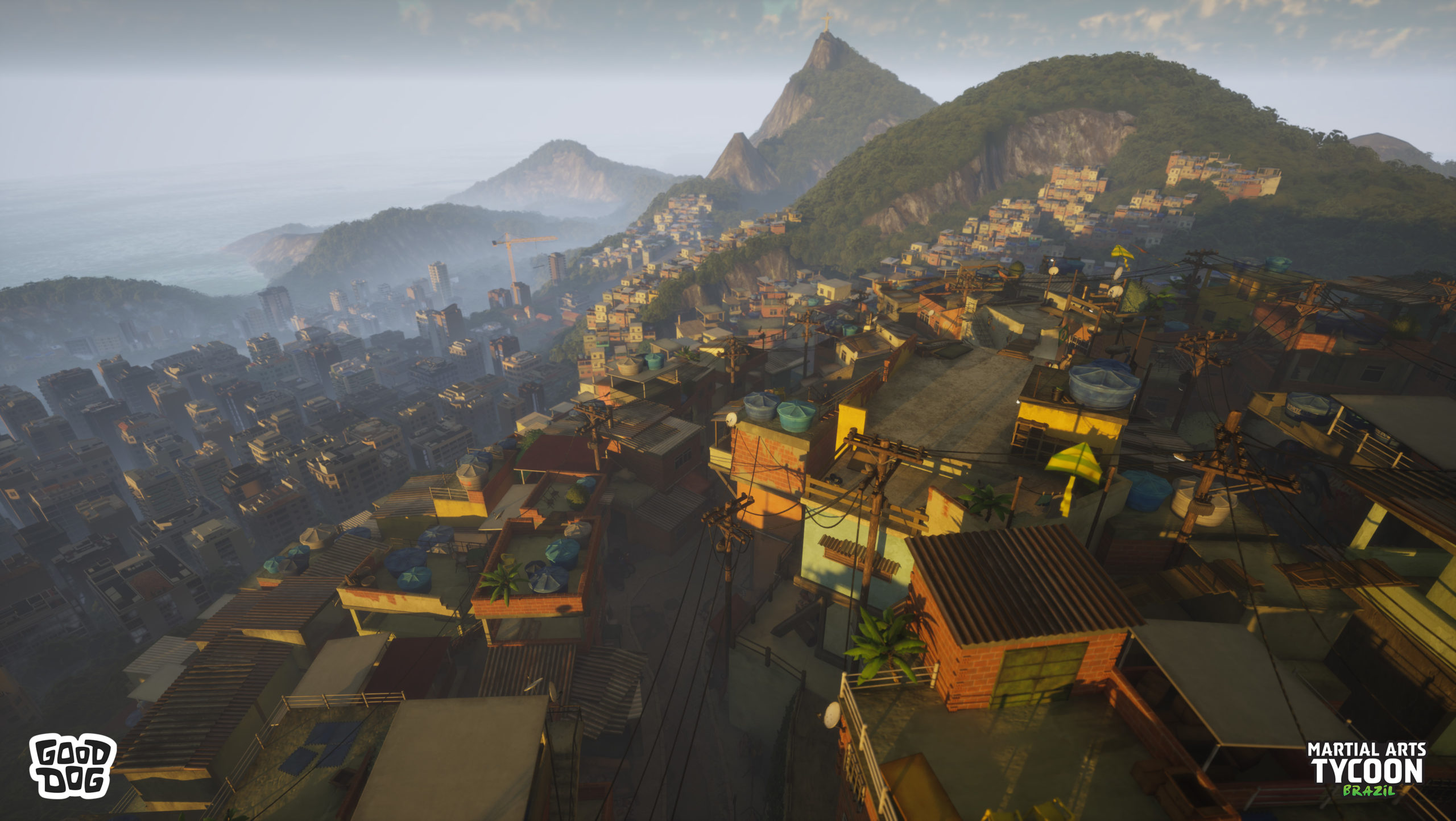
Good Dog Studios looks to blend tycoon, RPG and simulation elements to break new ground in the genre. As you might have guessed from the game’s title, Martial Arts Tycoon: Brazil transports you into the world of Brazilian Jiu-Jitsu in the heart of Rio De Janeiro’s vibrant favelas to manage a gym amongst the bustling community. The game has a launch window of 2024 initially for PC, but on consoles soon after.
Here’s more about the game from the press release:
Martial Arts Tycoon: Brazil invites players to step into the shoes of Lucas, who inherits his Uncle Renato’s gym and guides him with his pet capybara, Raphael. As they navigate the challenges faced by the favela community, including climate and health issues, players will train fighters for competitions, expand their gym, and engage with diverse NPCs, each with unique stories and motivations for joining the gym.
– HomeRun PR
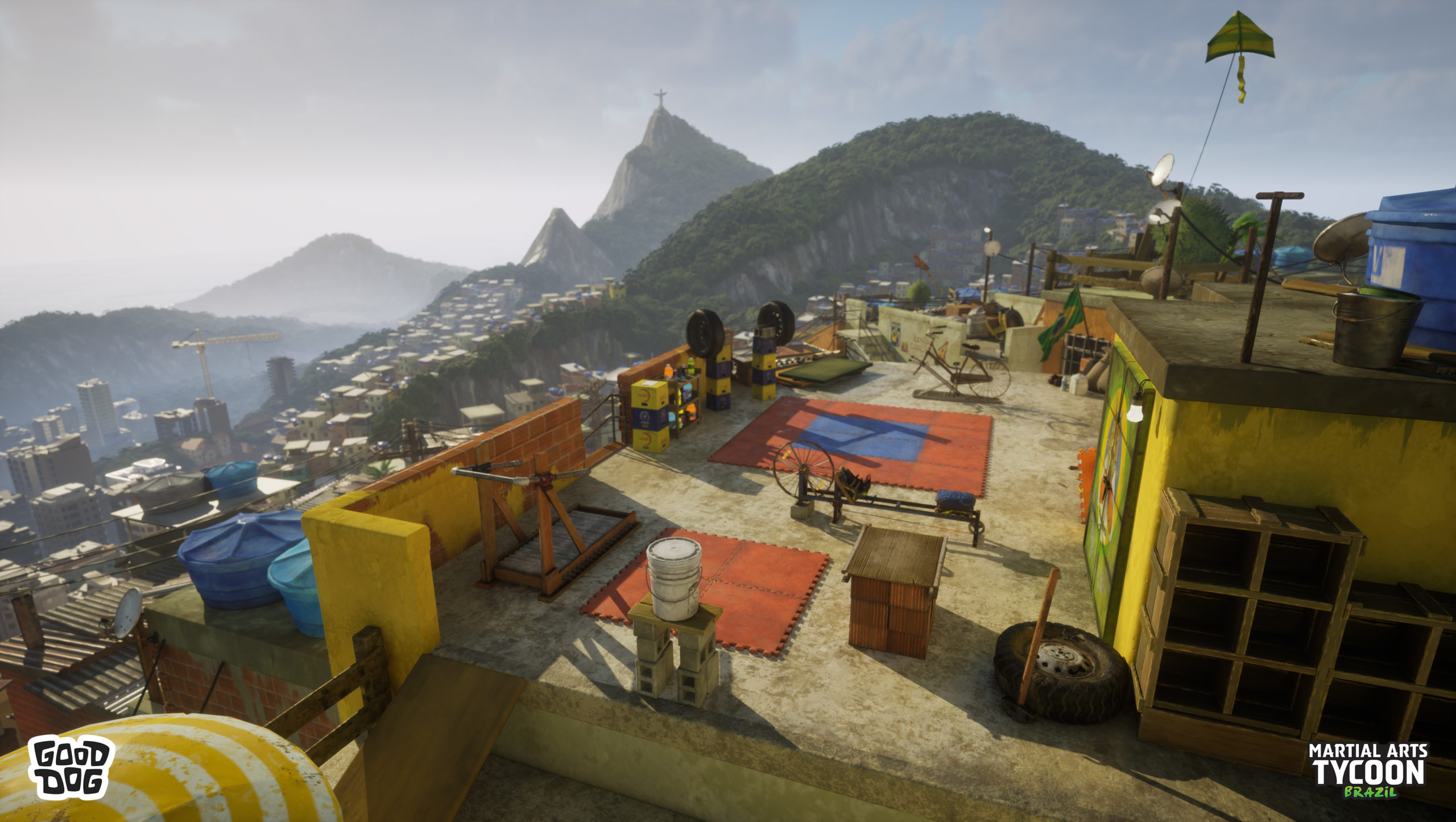
This is where the new motivation I previously mentioned comes in. The game is built with climate consciousness in mind. Players won’t only have to manage their gym but make strategic decisions to improve their local community, addressing environmental concerns to make a tangible difference in the world.
In addition to the cinematic trailer at BIG Festival, creative director and co-founder Chance Glasco will also be there to discuss the game’s development, unique features and the importance of addressing climate issues in the world through gaming. For now though, we also got our own chance to speak with Glasco about Martial Arts Tycoon: Brazil.
Interview With Chance Glasco
First of all, I’d like to thank you for taking the time to answer some questions for us. Martial Arts Tycoon: Brazil has a completely unique premise, what was the process of coming up with the concept of the game?
During the development of CoD:MW2, I got into watching Japanese MMA with a couple of my buddies at Infinity Ward. Outside of seeing a little bit of old Royce Gracie UFC fights years before, it was the first time I really was exposed to high level jiu-jitsu in MMA. It was really interesting to see these relatively non-physically dominating fighters absolutely handle someone larger and stronger than them.
At one point, Geoff and Ryan brought mats to the office and put them in one of our empty offices. They were showing me and one of our tech artists some basic jiu-jitsu techniques, and letting us roll with them. I was absolutely useless against either of them, purple and blue belts respectively. Looking back, it’s kind of sick that they were pitting game developer white belts against each other.
How has the development been compared to designing a AAA FPS?
The most obvious difference is the team size. When we left 2015 and started Infinity Ward, there were only 23 of us. By the time I left IW, I believe the team was around 300, and that’s not including all the other studios that were also working on the franchise.
My role has dramatically changed as well. I spent my time in the animation world, animating the first person weapons you see in the game. At the end of the project, I’d often work with Activision on the media and PR side of things, traveling across the world and speaking to the media from the perspective of a developer.
Now I’m wearing a lot of different hats. Working as a creative and project director, as well as involved in business development. I like the variety it offers, versus the full-time desk job. As much as I loved working as an animator on CoD, I think I just need more variety in my life now when it comes to the game development world.
Was the motivation for being climate conscious in the game world something you wanted to include from the start? Or something that gradually became a key theme?
There are some climate resilience related themes within the game, where they naturally fit. It would be difficult to make a sim game about training jiu-jitsu in a very hot climate without considering things like temperature and hydration. As a result, we’ve got a temperature system in the game based on the monthly median temperatures of Rio de Janeiro. If your NPCs are training outside, you’re going to have to make sure they have proper access to hydration and have other ways of staying cool.
I’ve also been a senior fellow with the Adrienne Arsht – Rockefeller Foundation Resilience Center (Arsht-Rock for short) for the last several years. They’re a non-profit, part of the Atlantic Council, that focuses on enhancing the resilience of individuals and communities. Driven by the critical need to find immediate, scalable solutions to address the widespread and intensifying consequences of climate change—threatening our families and communities, natural ecosystems, economic development, and political stability—we have set out to reach one billion people with resilience solutions by 2030.
As part of this effort, we’ve supported game development studios with any of the climate resilience related topics they might have in their game. We’ve also run a workshop, which we’ve given at GDC and a handful of major publishers on climate resilience in games. They will also be present at BIG Festival this summer in Brazil where we will be revealing Martial Arts Tycoon: Brazil first trailer.
How do you hope players respond to the climate focus during and after playing the game?
I’m hoping a portion of the players playing the game pick up some useful knowledge they could later apply in a real-life situation.
Regarding the temperature system I mentioned earlier, we’ll also have heatwave events in the game. And it just so happens that Arsht-Rock has actually recently created a heatwave naming and categorization system, which they’re piloting around the world right now. You know the system they have for hurricanes, where they give it a category number and then a name? People respect this system. Most people know when a category 4 or 5 hurricane is coming, they should evacuate. With heatwaves, which cause more deaths each year than any other climate event, there has been no such system.
So in Martial Arts Tycoon: Brazil, when there’s a heat wave, we’ll be using a system inspired by that one, something which is very likely to be scaled internationally in the near future. The strength of the heatwave, which varies from level 0 to level 3, will determine the risk it is to your NPCs. Certain NPCs that are older or have negative health traits, will have to be especially protected when there’s a serious heatwave to keep them from having heat exhaustion or a stroke.
What are some of the game features you’re most excited for players to enjoy?
I’m really excited to see how players grow attached to their characters over time. Every character will have a procedurally generated character history, which will influence the character traits and attributes the NPC has. For example, an NPC with a rough childhood might have a higher chance of getting the ‘bully’ trait, which then means they’re a larger injury risk to training partners.
While there are building aspects within the game, we’re taking a heavier focus on character building and character development. I want the player to be proud of when one of their NPCs gets their next belt promotion. Or even be happy when they see an NPC walk through the door and decide to train that day.
I think players will also enjoy the aspect of managing their gym to try to please all their clientele. Players will have to create jiu-jitsu classes that cater to the needs of their NPCs. Do they offer classes at the right time of day? Do you have enough classes to please newer whitebelts, as well as the more experienced grapplers who are looking for more advanced techniques?
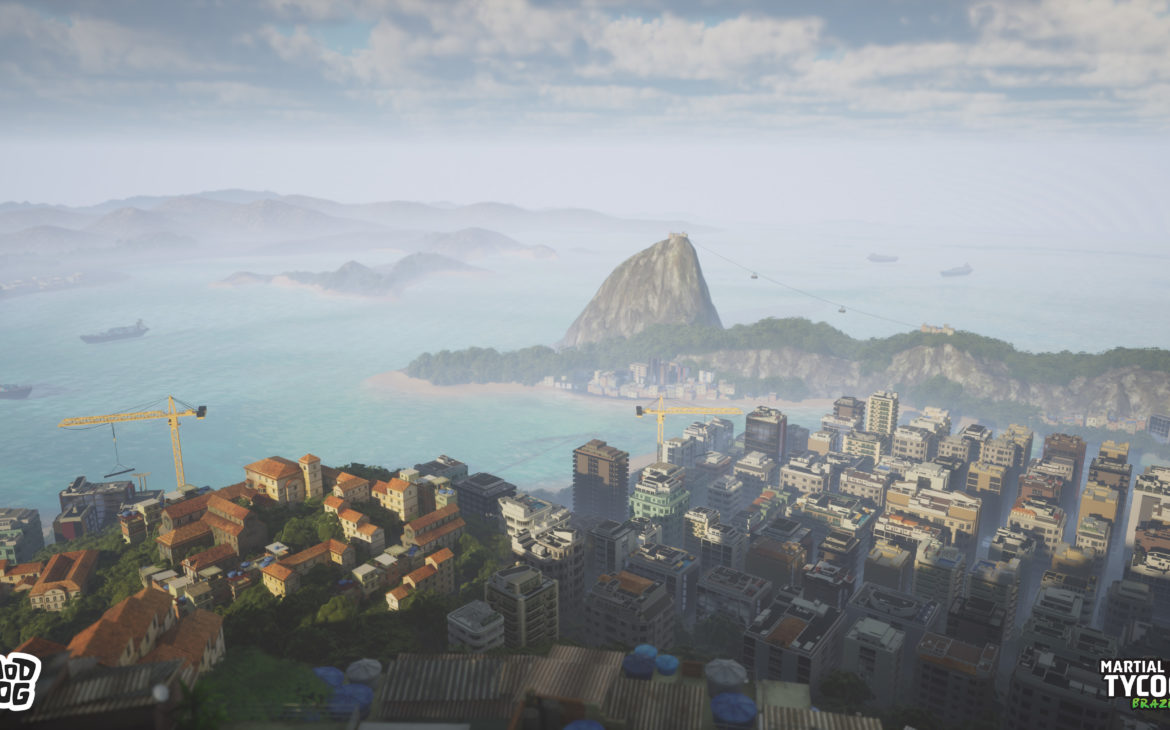
The Tycoon genre is generally about capitalistic gain to further improve what you own, but Martial Arts Tycoon: Brazil seems to emphasize the community aspect of favelas, do you think this looks to challenge players’ process of decision-making?
While favelas are heavily part of the game, especially early on, you will be expanding your gym to other locales around Rio de Janeiro. You’ll have to please different types of clientele depending on what neighborhood you have a gym in.
With the in-game events, we want the player to be able to make some choices that could potentially have a positive impact on their community around them. Particularly within the favelas, there are a lot of jiu-jitsu social projects that help kids stay occupied and away from the issues of the streets.
There’s also the fact that pretty much any time you see Brazilian favelas in a video game or a film, all they focus on is the violence between drug dealers and police. I know this, because I worked on one of those games. While this is a very true reality in many favelas, I think it unfortunately gives people the false impression that most people living in favelas are drug dealers or violent. You rarely see the relatively normal families either struggling to make it or just enjoying their lives day to day. I’m hoping Martial Arts Tycoon: Brazil gives a more full spectrum look into this.
As an abridge to the climate Q’s, will these themes and ideas present gameplay challenges to overcome or add more layers to the development of your gym?
A lot of these climate related scenarios are going to exist within the event system. They’ll add to the many non-climate related problems and scenarios that arise while playing.
In terms of Jiu-jitsu, will there be ways to customize characters’ fighting styles, moves and abilities? Will there be tournaments to strategize for?
Without giving away too much too early, there will be different techniques and skills for the characters to focus on and each character will develop differently from each other. Eventually trainees will be able to enter into tournaments, but it’s important to remember that the vast majority of people that train, they don’t compete. They are more casual like me, there for the health, entertainment and social aspects and maybe the self-defense aspect as a bonus. NPCs will have their own particular goals they want to achieve and most character’s goals are not about becoming a world champion fighter. That being said, towards the middle and end game you will be involved in a lot more tournaments and fights.
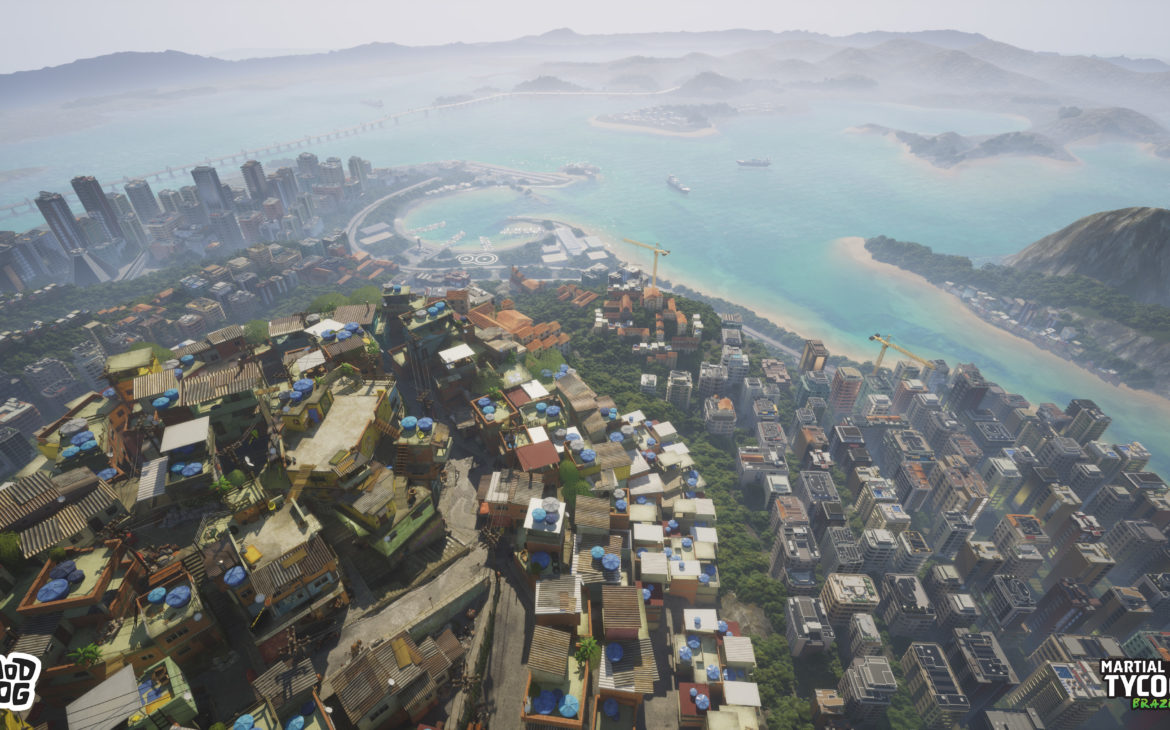
Given how unique the game looks, were there any particular inspirations for the art style and sense of design?
The biggest inspiration was living in Rio de Janeiro for several years, just two blocks from Morro Santo Amaro, the favela you see in our first released screenshots. There was sort of a gritty beauty to that area, which I hope players also can appreciate within the game.
We also have a couple of amazing artists, Diego (character artist from Rio) and Sarthak (environment artist in Vancouver). And although our environment artist hasn’t been to Rio himself, he’s really nailed the look and vibe using our art direction board and through his research.
Because Martial Arts Tycoon: Brazil has a large focus on character development, we thought it was worth stepping up the bar art-wise for this project. If you were building a theme park or a hospital in a tycoon game, you’d be covering a large sprawling area. It makes sense to have the camera zoomed out more. But in a game where you build a jiu-jitsu gym, there’s no reason to have the gameplay camera so far away from your NPCs.
Looking at Call of Duty today, do you still recognise any of your DNA in there? Can you still see your blueprint in the new generations of the franchise?
I think the fundamental pillars of Call of Duty are still there overall as a game. A solid framerate with arguably the best first-person controls in any franchise. Multiplayer is still a blast. Mark Grigsby is back at Infinity Ward, who was a lead and mentor to me when we worked together for years, so the first person viewmodel animations are still the best in the industry.
That being said, most of these things are not because of my DNA, but rather the DNA of the entire team that develops these games.
–
We’d like to thank Chance Glasco for their time to answer our questions about the game, it’s only made us here at Finger Guns more excited to see what’s in store; for now Martial Arts Tycoon: Brazil will have its trailer debut at Brazil’s International Games Festival on the 30th June 2023.
[Source: Press Release]
For more News click here.
Make sure to follow Finger Guns on our social channels –Twitter, Facebook, Twitch, Spotify or Apple Podcasts – to keep up to date on our news, reviews and features.
If you enjoyed this article or any more of our content, please consider our Patreon.
